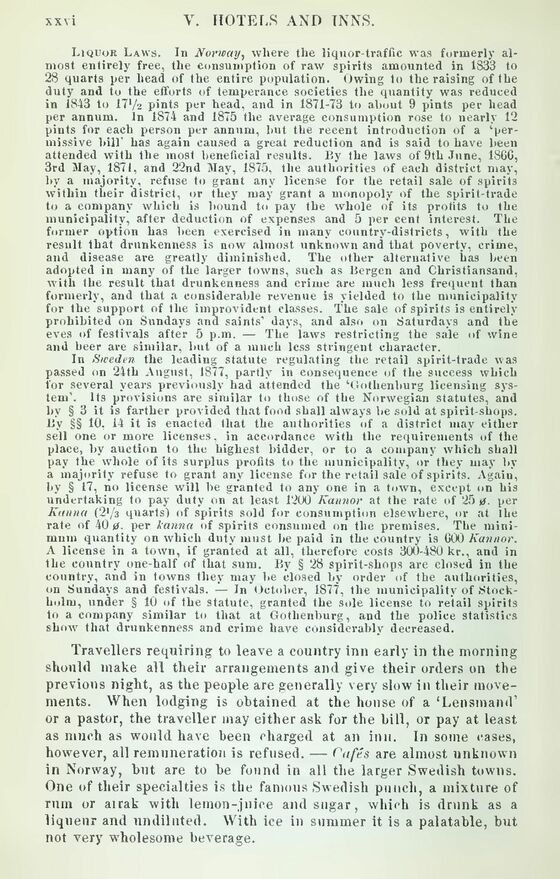
Full resolution (JPEG) - On this page / på denna sida - Introduction - Pages ...

<< prev. page << föreg. sida << >> nästa sida >> next page >>
Below is the raw OCR text
from the above scanned image.
Do you see an error? Proofread the page now!
Här nedan syns maskintolkade texten från faksimilbilden ovan.
Ser du något fel? Korrekturläs sidan nu!
This page has never been proofread. / Denna sida har aldrig korrekturlästs.
Liquor Laws. In Norway, where the liquor-traffic was formerly
almost entirely free, the consumption of raw spirits amounted in 1S33 to
28 quarts per head of the entire population. Owing to the raising of the
duty and to the efforts of temperance societies the quantity was reduced
in 1843 to ll’/o pints per head, and in 1871-73 to about 9 pints per head
per annum. In 1874 and 1875 the average consumption rose to nearly 12
pints for each person per annum, hut the recent introduction of a
‘permissive hill’ has again caused a great reduction and is said to have been
attended with the most beneficial results. By the laws of 9th June, I860,
3rd May, 1871, and 22nd May, 1875, the authorities of each district may,
by a majority, refuse to grant any license for the retail sale of spirits
within their district, or they may grant a monopoly of the spirit-trade
to a company which is bound to pay the whole of its profits to the
municipality, after deduction of expenses and 5 per cent interest. The
former option has been exercised in many country-districts, with the
result that drunkenness is now almost unknown and that poverty, crime,
and disease are greatly diminished. The other alternative has been
adopted in many of the larger towns, such as Bergen and Christiansand,
with the result that drunkenness and crime are much less frequent than
formerly, and that a considerable revenue is yielded to the municipality
for the support of the improvident classes. The sale of spirits is entirely
prohibited on Sundays and saints’ days, and also on Saturdays and the
eves of festivals after 5 p.m. — The laws restricting the sale of wine
and beer are similar, but of a much less stringent character.
In Sweden the. leading statute regulating the retail spirit-trade was
passed on 24th August, 1877, partly in consequence of the success which
for several years previously had attended the ‘Gothenburg licensing
system’. Its provisions are similar to those of the Norwegian statutes, and
by § 3 it is farther provided that food shall always be sold at spirit-shops.
By §§ 10, 14 it is enacted that the authorities of a district may either
sell one or more licenses, in accordance with the requirements of the
place, by auction to the highest bidder, or to a company which shall
pay the whole of its surplus profits to the municipality, or they may by
a majority refuse to grant any license for the retail sale of spirits. Again,
by § 17, no license will lie granted to any one in a town, except on his
undertaking to pay duty on at least 1200 Kannor at the rate of 25 tS. per
Kanna (2’/3 quarts) of spirits sold for consumption elsewhere, or at the
rate of 40 ø. per tanna of spirits consumed on the premises. The
minimum quantity on which duty must be paid in the country is GOO Kannor.
A license in a town, if granted at all, therefore costs 300-480 kr., and in
llie country one-half of that sum. By § 28 spirit-shops are closed in the
country, and in towns they may be closed by order of the authorities,
on Sundays and festivals. — In October, 1877, the municipality of
Stockholm, under § 10 of the statute, granted the sole license to retail spirits
to a company similar to that at Gothenburg, and the police statistics
show that drunkenness and crime have considerably decreased.
Travellers requiring to leave a country inn early in the morning
should make all their arrangements and give their orders on the
previous night, as the people are generally very slow in their
movements. When lodging is obtained at the house of a ‘Lenstnand’
or a pastor, the traveller may either ask for the hill, or pay at least
as much as would have been charged at an inn. In some cases,
however, all remuneration is refused. — Pafts are almost unknown
in Norway, but are to be found in all the larger Swedish towns.
One of their specialties is the famous Swedish punch, a mixture of
rum or airak with lemon-juice and sugar, which is drunk as a
liqueur and undiluted. With ice in summer it is a palatable, but
not very wholesome beverage.
<< prev. page << föreg. sida << >> nästa sida >> next page >>